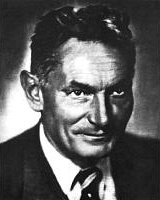- Vsevolod Pudovkin
Infobox Person
name = Vsevolod Pudovkin

image_size =
caption =
birth_date = birth date|1893|2|16|mf=y
birth_place =Russia
death_date = death date and age|1953|6|20|1893|2|16|mf=y
death_place =
occupation =Film director
spouse =
parents =
children =Vsevolod Illarionovich Pudovkin ( _ru. Всеволод Илларионович Пудовкин) (
February 16 ,1893 –June 20 ,1953 ) was aRussia nfilm director who developed influential theories of montage. Pudovkin's masterpieces are often contrasted with those of his contemporarySergei Eisenstein , but whereas Eisenstein utilized montage to glorify the power of the masses, Pudovkin preferred to concentrate on the courage and resilience of individuals.A student of engineering at
Moscow University , Pudovkin saw active duty duringWorld War I , being captured by the Germans. After the war, he abandoned his professional activity and joined the world of cinema, first as a screenwriter, actor and art director, and then as an assistant director toLev Vladimirovich Kuleshov .After a few tries with advertising cinema, he directed in 1926 that which will be considered one of the masterpieces of
silent movies : "Mother", where he developed several montage theories that will make him famous.His first feature was followed by "
The End of St. Petersburg " (1927), and "Storm Over Asia " (also known as "The Heir of Genghis Khan"), titles which compose a trilogy at the service of the bolshevik revolutionary policy.In 1928, with the advent of
talkies , Pudovkin, Eisenstein and Alejandrov signed theManifest of Sound , in which the possibilities of sound are debated, and always understood as a complement to image. This idea would be brought to bear in his next pictures: "A Simple Case / Life is Beautiful" (1932) and "The Deserter" (1933), works that do not match the quality of earlier work.With an interruption due to health concerns, Pudovkin returned to the movies in 1938, with a cycle of historic pieces that are not as successful as earlier works: "Victory" (1938); "
Minin and Pozharsky " (1939) and "General Suvorov" (1941).With the end of
World War II , under Party criticism, he returned to his earlier subjects. His last work was "The Return of Vasili Bortnikov " (1952).Filmography
* "
Hunger... Hunger... Hunger " (1921)
* "Chess Fever " (1925)
* "Mechanics of the Brain " (1926)
* "Mother" (1926)
* "The End of St. Petersburg " (1927)
* "Storm Over Asia " (1928)
* "A Simple Case " (1932)
* "The Deserter" (1933)
* "Mother and Sons " (1938) - also known as "Victory".
* "Minin and Pozharsky " (1938)
* "Film in XX years " (1940)
* "Collection of Films for the Armed Forces #6 " (1941)
* "General Suvorov" (1941)
* "The Murderers are Coming " (1942)
* "In the Name of the Motherland " (1943)
* "Admiral Nakhimov" (1946)
* "Three Encounters " (1948)
* "Zhukovsky" (1950)
* "The Return of Vasili Bortnikov " (1952)Published works
* Film Technique
* Film ActingReferences
* "Mother" DVD extras, "Las Orígenes del Cine", Suevia Films
Spain .External links
*
* [http://www.guardian.co.uk/friday_review/story/0,,544322,00.html The silent revolutionary] : Jonathan Jones on the work of Vsevolod Pudovkin, atGuardian Unlimited
Wikimedia Foundation. 2010.
